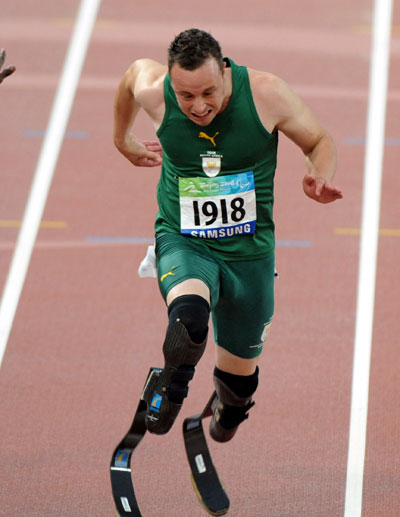The 21-year-old had sought to compete in last month's Beijing Olympics but eventually failed to reach the qualifying standard.
Pistorius said had it not been for the legal case with the International Association of Athletics Federations (IAAF) -- which ruled the J-shaped blades gave him an advantage over able-bodied athletes -- he might have qualified for the Olympics.
 |
|
Oscar Pistorius crosses the finish line. He wins the men's TT44 100m sprint in 11.17 seconds Tuesday night at the Bird's Nest stadium. [Xinhua]
|
However, Pistorius insisted that in no way he considered topping the Paralympic podium a consolation prize for missing out on the Olympics.
"I never think that the Paralympics is a second class event," he said.
"Coming to the Paralympics, the competition is always strong and it's a world class event. It's on the same stage as the Olympics and it's something I'm very proud to be a part of."
Pistorius' comptriot Natalie du Toit, who led the South African Paralympic delegation at the opening ceremony last Sturday night, is, by no means, inferior to Olympians.
The first female amputee to compete in an able-bodied Olympics, du Toit finished 16th among 25 competitors in the 10-kilometer open-water swim last month at the Beijing Games, which disappointed her but was a marvelous achievement to anyone else.
"She's not just an inspiration to open-water swimmers and not just to sportsmen," British silver medalist Keri-Anne Payne said after the race, "but to anybody in the whole world that you can do anything you want."
Du Toit, who lost her lower left leg in a motorcycle accident in 2001, won five golds and a silver in the Athens Paralympics. Again, she will try for five golds in Beijing.
"It's not about being disabled or able-bodied -- it's all the same to me," she said. "I just get up and I race."
(Xinhua News Agency September 10, 2008)